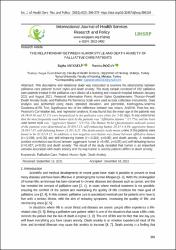| dc.contributor.author | Doğan, Runida | |
| dc.date.accessioned | 2022-03-15T12:26:01Z | |
| dc.date.available | 2022-03-15T12:26:01Z | |
| dc.date.issued | 2021 | en_US |
| dc.identifier.citation | MENEKLİ, T., & DOĞAN, R. THE RELATIONSHIP BETWEEN HUMOR STYLE AND DEATH ANXIETY OF PALLIATIVE CARE PATIENTS. International Journal of Health Services Research and Policy, 6(3), 369-379. | en_US |
| dc.identifier.uri | https://doi.org/10.33457/ijhsrp.996104 | |
| dc.identifier.uri | https://hdl.handle.net/20.500.12899/644 | |
| dc.description.abstract | This descriptive and relational study was conducted to examine the relationship between
palliative care patients' humor styles and death anxiety. The study sample consisted of 282 palliative
care patients treated in the palliative care clinics of a training and research hospital between January
2021 and August 2021. Personal Information Form, Humor Styles Questionnaire, Thorson-Powell
Death Anxiety Scale, and Palliative Performance Scale were used as data collection instruments. Data
analysis was performed using mean, standard deviation, and percentile, Kolmogorov-Smirnov
Goodness-of-Fit Test, Significance test of the difference between two means, ANOVA, Post-hoc test,
Pearson's Correlation test, and regression analysis. It was found that the mean age of the patients was
49.58±9.56 and 52.1% were hospitalized in the palliative care clinic for 5-10 days. It was determined
that the most frequently used humor style by the patients was “Affiliative Humor” (31.7%), and the least
used humor style was “Aggressive Humor” (19.5%). The Humor Styles Questionnaire subscale scores
of the patients were determined as 31.05±7.11, self-enhancing humor 28.34 ± 6.94, aggressive humor
26.85±7.37, self-defeating humor 23.50± 6.21. The death anxiety scale mean scores of the patients were
found to be 81.62±9.12. In addition, a low negative correlation was found between affiliative humor
(r=-0.298; p<0.05) and self-enhancing humor (r=-0.318; p<0.05) and death anxiety. A moderate
positive correlation was found between aggressive humor (r=0.450; p<0.05) and self-defeating humor
(r=0.427; p<0.05) and death anxiety. The result of the study revealed that humor is an important
variable associated with death anxiety and the way humor is used by patients differs in death anxiety. | en_US |
| dc.language.iso | en | en_US |
| dc.relation.ispartof | International Journal of Health Services Research and Policy | en_US |
| dc.rights | info:eu-repo/semantics/openAccess | en_US |
| dc.subject | Palliative Care, | en_US |
| dc.subject | Patient, | en_US |
| dc.subject | Humor Style, | en_US |
| dc.subject | Death Anxiety | en_US |
| dc.title | The Relationship Between Humor Style And Death Anxiety Of Palliative Care Patıents | en_US |
| dc.type | Article | en_US |
| dc.department | MTÖ Üniversitesi, Sağlık Bilimleri Fakültesi, Hemşirelik Bölümü | en_US |
| dc.institutionauthor | Menekli, Tugba | |
| dc.identifier.volume | 6 | en_US |
| dc.identifier.issue | 3 | en_US |
| dc.identifier.startpage | 369 | en_US |
| dc.identifier.endpage | 379 | en_US |
| dc.relation.publicationcategory | Makale - Uluslararası - Editör Denetimli Dergi | en_US |


















